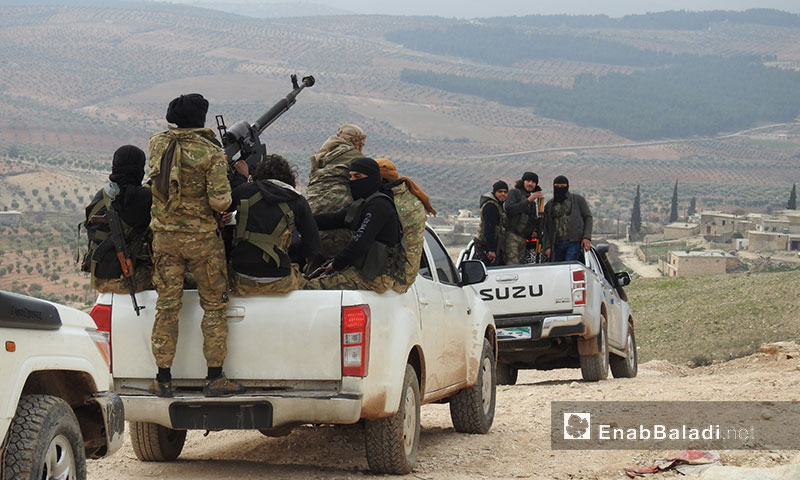Under the title “combating corruption,” the “National Army” launched a series of intensive security campaigns in rural Aleppo, raising many questions about the real derive for these actions.
On November 15, the “Army,” backed by Turkey, in cooperation with the “Military Police,” has started its security campaign, targeting four cities in rural Aleppo, beginning with Afrin, to then cover Jarabulus, al-Rai and al-Bab.
The campaign is accompanied by a curfew in the four targeted cities, amidst confrontations in the city of Afrin while chasing the prosecuted, ending with several deaths and the arrest of those wanted for the Army’s factions.
Though the Army has declared the objectives of its campaign, as being a part of what it referred to as “eliminating corrupt groups” of some of the out of control factions, people with a different perspective believe that the campaign has hidden political goals, through which the “National Army” and the Turkish side aim to impose their policies undercover of different titles.
The campaign’s first steps took place in the city of Afrin against the “al-Sharqiya Martyrs Gathering,” which surrendered all its posts at the al-Vilat Street, Afrin, and retreated to the Jindires district, according to a deal under the patronage of “al-Sham Legion.”
Turkish Political Agenda
Through the Turkish support of the opposition factions in northern Aleppo, manifested in a joint or indirect control of the area, Turkey seeks to unify the powers in the cities covered by the security campaign led by the factions it backs.
The Turkish participation in the security campaign in northern Aleppo became clear, following the spread of forces affiliated with the Presidency of the Turkish Special Forces on Thursday, November 15, under the name “Syrian Task Force” in the city of Afrin, according to the Turkish Anadolu Agency.
According to the Agency, the Task Force consists of 12 units, each contains troops of the special Turkish force branches in Ankara, Gaziantep and Hatay. It trains and qualifies Afrin city’s people police, in addition to providing the equipment needed for preserving security there.
The security campaign attracted the attention of Turkish media outlets, for the Turkish HABER TV channel has reported the curfew in Jarabulus.
Implicit Goals?
Enab Baladi has conducted a poll of opinion on its “Facebook” page. Out of the 1200 persons voters, 65% considered that the reasons laying behind the security campaign in northern Aleppo are undeclared political ones, while the remaining 35% believe that the campaign’s objective is combating the corrupt groups.
The comments focused on the idea that Turkey does not want any of the factions out of its control to destabilize the area or advance ideas that do not comply with its policies.
The poll’s result goes hand in hand with targeting the “al-Sharqiya Martyrs Gathering,” which started a military operation against the Assad’s forces on the calm Tadef front last July. Back then, the faction said that the operation is to avenge the Daraa battles, after which the fingers of blame and accusation were directed at it by the factions that accused it of shacking the area’s security.
At the same time, northern rural Aleppo has witnessed a state of security chaos and recurrent thefts and kidnappings, in addition to confrontations between a few factions and other groups, which necessitated controlling the situation in the area.
The “national Army” receives financial and military support from Turkey, and the last operation it participated in was in the area of Afrin, which it completely controlled with a principal support from the Turkish army early this year.
Turkey backed the factions of the “Free Army” in the northern and eastern Aleppo in their control over large areas from the grip of the “Islamic State” (ISIS) in 2016, including Jarabulus, al-Bab and the towns and villages surrounding it.

